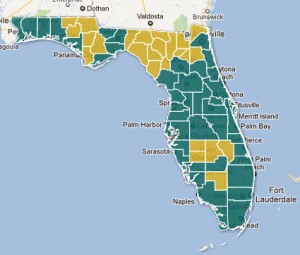School Boards Getting Tough on Charter Applications

Matt Stiles / StateImpact Florida
More than one-third of Florida school districts did not have a charter school during the 2010-2011 school year.
Seminole County school board chairwoman Dede Schaffner admits it — her county is tough on people wanting to open new charter schools.
But Schaffner said the district isn’t asking anything more than the state asks of Seminole County.
Last month the school district rejected three applications for new charter schools.
In one case, district officials argued they already offered the online courses proposed by a virtual charter school.
In another, they rejected a plan from a for-profit company to replicate its ‘A’-rated South Florida charter in Seminole County. It’s a direct challenge to a new state law that makes it easier for high-rated charter school to expand.
Schaffner said Seminole County has had to close charter schools in the past and knows how to identify red flags in an application.
“We just felt like the ones that applied did not live up to the expectations of Seminole County,” Schaffner said. “We have to be sure that we improve student learning.”
Just 1 percent of Seminole County students are enrolled in a charter school, according to data analyzed by StateImpact Florida. That’s lower than other Central Florida counties such as Brevard, Lake, Osceola and Orange. All those counties have at least three times the percentage of students enrolled in charter schools.
Schaffner said that’s because Seminole County offers a high-quality education and not because the school board is too critical of charter applicants.
But charter school advocates argue Florida should have an independent body approve applications. They say school boards see them as competition and have a financial incentive to deny new charter schools.
Charter Franchise Not Welcome
Seminole County may be particularly tough on new charter schools, but it’s not the only district turning them down.
Fort Lauderdale-based Charter Schools USA is trying to franchise its “A” rated Renaissance Charter School in Doral to Seminole and Polk counties. The company wants to bring its Keys Gate charter school in Homestead to Pasco.
Pasco County gave initial approval to the fast-track request, despite questions about the school’s plan. The district said they could reject the school later.
Seminole turned them down. Polk County – which has the sixth-highest percentage of charter enrollment in the state — also rejected their application.
Charter Schools USA said it would appeal the Polk County decision to the state Board of Education. Attorney Ed Pozzouli criticized the school board for making this into a legal battle.
“One would ask why they would spend additional tax dollars to prevent a quality school to come into the community,” he told the Lakeland Ledger.
The company’s CEO, Jonathon Hage, says it’s time for the next step in the evolution of charter schools: copying what works. He says high-performing schools should have fewer hurdles to clear for approval.
“When you have a school that has opened up in a high-poverty, low-performing area,” he said, “and that charter school has consistently out-performed its peers, then they have practices and processes and learned outcomes…that should be replicated.”
Hage praised the fast-track law approved this year as a national model. But other charter school advocates note that Florida’s law has one major shortcoming.
Florida’s charter school laws are the tenth-strongest in the country, according to Alison Consoletti, a researcher with the Washington, D.C.-based Center for Education Reform. But Consoletti said Florida’s one weakness is that it does not allow an independent body – such as a university or committee – to approve charter schools.
“Some school boards see them as competition,” Consoletti said.
Playing By the Same Rules
Seminole County has not rejected every charter school.
The Galileo School for Gifted Learning opened in Sanford this fall. Founder Michele Gill said the school board asked her charter to abide by public school class size limits, rather than more forgiving charter school rules.
“It’s hard for a charter school coming in to compete with the quality of the schools we have.”
-Seminole County school board chairman Dede Schaffner
Gill said the school agreed as a gesture of good faith.
Schaffner has no qualms about asking more of charter school than state law requires.
“I don’t believe it’s fair,” Schaffner said of the less restrictive rules governing charter schools.
As school boards complain about preferential treatment given to charter schools, state leaders are eyeing new laws to make it easier for them to open.
Gov. Rick Scott’s draft legislative agenda includes a so-called ‘parent trigger’ bill. It allows a majority of parents to vote to convert their school into a charter. Currently, you can only convert a school to a charter if a majority of both teachers and parents agree.
Some school boards are worried that decisions about charter schools could be taken out of their hands entirely.
Clay County is the state’s largest district without a charter school. Officials cite the A-rated schools and an academy system offering specialized instruction in aerospace, agricultural science and other high-tech field for heading off demand for charter schools.
Four charters have applied to the school district, though none made it through the review process to a school board vote.
Clay County school board chairman Frank Ferrell said his district will compete to make sure state dollars remain with traditional schools and not go elsewhere. Charters have a role, he said, but he says students there don’t perform any better than their counterparts in traditional schools.
He worried lawmakers would further erode the limited oversight school districts have over charters.
“I think some of that authority is being taken away,” Ferrell said.
Seminole County’s Schaffner said charter school applicants should expect the scrutiny. Once a charter is open it takes time for a school district to shut down a poorly performing or insolvent school and those students could lose a year or more of class time.
“We don’t take it lightly,” she said. “It’s hard for a charter school coming in to compete with the quality of the schools we have.”

